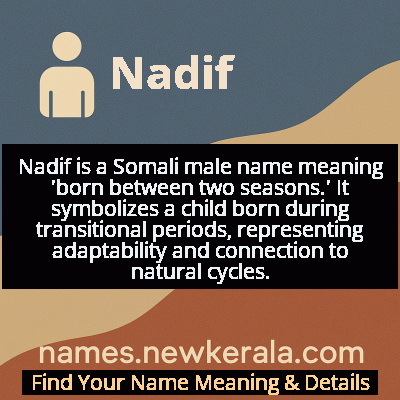Nadif Name Meaning & Details
Origin, Popularity, Numerology Analysis & Name Meaning of Nadif
Discover the origin, meaning, and cultural significance of the name NADIF. Delve into its historical roots and explore the lasting impact it has had on communities and traditions.
Name
Nadif
Gender
Male
Origin
African
Lucky Number
7
Meaning of the Name - Nadif
Nadif is a Somali male name meaning 'born between two seasons.' It symbolizes a child born during transitional periods, representing adaptability and connection to natural cycles.
Nadif - Complete Numerology Analysis
Your Numerology Number
Based on Pythagorean Numerology System
Ruling Planet
Neptune (Ketu)
Positive Nature
Intuitive, analytical, spiritual, and inquisitive.
Negative Traits
Secretive, reserved, aloof, and can be overly critical.
Lucky Colours
Green, yellow.
Lucky Days
Monday.
Lucky Stones
Cat’s eye, moonstone.
Harmony Numbers
1, 5, 6.
Best Suited Professions
Scientists, researchers, spiritual leaders, detectives.
What People Like About You
Depth of knowledge, analytical skills, spirituality.
Famous People Named Nadif
Nadif Ahmed
Athlete
Somali long-distance runner who has represented Somalia in international competitions
Nadif Mohamed
Community Leader
Prominent Somali diaspora activist working on youth empowerment and cultural preservation
Nadif Hassan
Businessman
Successful entrepreneur in East African trade and logistics sectors
Name Variations & International Equivalents
Click on blue names to explore their detailed meanings. Gray names with will be available soon.
Cultural & Historical Significance
The name reflects the Somali people's deep connection to their environment and the nomadic heritage that has shaped their cultural identity for centuries. It represents a worldview where human life is intimately connected to natural cycles, and individuals born during transitional periods are thought to carry special destinies or talents that allow them to mediate between different circumstances or communities. This cultural significance has been maintained through generations, with the name continuing to symbolize the importance of adaptability in Somali cultural values, particularly relevant for a people with a strong history of migration and resilience.
Extended Personality Analysis
Individuals named Nadif are often perceived as possessing adaptable and balanced personalities, reflecting their name's meaning of being born between seasons. They tend to demonstrate remarkable flexibility in various situations, able to adjust to changing circumstances with grace and resilience. This adaptability often makes them excellent mediators and problem-solvers, as they can understand multiple perspectives and find common ground. Many Nadifs exhibit a natural curiosity and openness to new experiences, combined with a thoughtful, reflective nature that allows them to process complex situations effectively.
Their transitional birth symbolism often manifests as individuals who are comfortable with ambiguity and change, making them particularly suited for roles requiring innovation or bridging different cultures, ideas, or communities. They typically possess strong intuitive abilities and emotional intelligence, enabling them to read situations accurately and respond appropriately. While they may sometimes struggle with decisiveness when faced with clear-cut choices, their ability to see nuance and complexity makes them valuable in collaborative environments and leadership positions requiring diplomatic skills. The name's association with seasonal transition also suggests individuals who understand the natural rhythms of growth and change, often displaying patience and timing in their actions.
Modern Usage & Popularity
In contemporary times, the name Nadif continues to be popular among Somali communities both in the Horn of Africa and throughout the global diaspora. While maintaining its traditional significance, the name has evolved to represent broader concepts of cultural bridging and adaptability in modern contexts. Among younger generations, Nadif is often chosen to honor heritage while embracing the transitional identities many diaspora Somalis experience. The name appears with consistent frequency in Somali communities worldwide, though it remains relatively uncommon outside these cultural contexts. Recent trends show some parents choosing Nadif for its melodic quality and positive symbolism of flexibility and resilience, qualities highly valued in rapidly changing global societies. The name maintains strong cultural authenticity while being accessible to non-Somali speakers, contributing to its enduring popularity across generations.
Symbolic & Spiritual Meanings
Symbolically, Nadif represents the concept of liminality - existing in transitional spaces between defined states. This extends beyond the literal meaning of seasonal transition to encompass broader metaphorical interpretations. The name symbolizes adaptability, resilience, and the ability to thrive in changing circumstances. It represents individuals who can bridge different worlds, whether cultural, social, or intellectual. The seasonal transition symbolism also suggests renewal, growth, and the continuous cycle of change and transformation. In a deeper sense, Nadif embodies the idea of potential and new beginnings, much like the transitional periods between seasons that hold the promise of what is to come while carrying the wisdom of what has passed. This makes the name particularly resonant for those navigating multiple cultural identities or living through periods of significant change.

